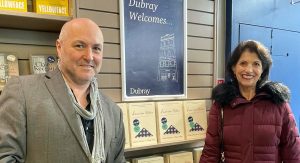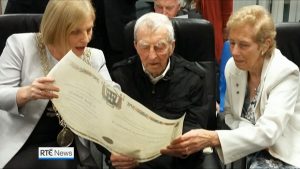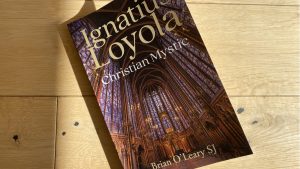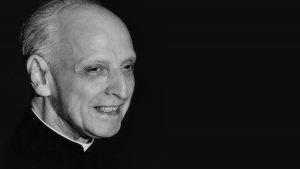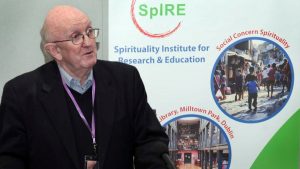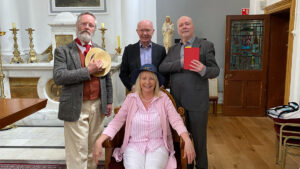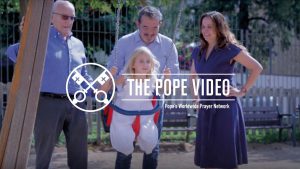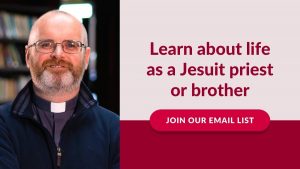Ecumenics book launch
 Archbishop Diarmuid Martin and Irish School of Ecumenics (ISE) director, Linda Hogan, were the main speakers at the launch of the book The Irish School of Ecumenics, 1970-2007, edited by Michael Hurley SJ. It was launched at a reception in the Milltown Institute on Thursday 3 April. The Catholic Archbishop Diarmuid Martin was joined by the Church of Ireland Archbishop, John Neill, and the former bishop of Cork, Cloyne and Ross, Roy Warke (pictured here with M. Hurley). The book, which is available from Columba Press, features contributions from Robin Boyd, John D’Arcy May, Geraldine Smyth OP, and the current head of ISE, Linda Hogan. Click on ‘Read more’ below to read the press release and Michael Hurley’s address in response to the words of Archbishop Martin.
Archbishop Diarmuid Martin and Irish School of Ecumenics (ISE) director, Linda Hogan, were the main speakers at the launch of the book The Irish School of Ecumenics, 1970-2007, edited by Michael Hurley SJ. It was launched at a reception in the Milltown Institute on Thursday 3 April. The Catholic Archbishop Diarmuid Martin was joined by the Church of Ireland Archbishop, John Neill, and the former bishop of Cork, Cloyne and Ross, Roy Warke (pictured here with M. Hurley). The book, which is available from Columba Press, features contributions from Robin Boyd, John D’Arcy May, Geraldine Smyth OP, and the current head of ISE, Linda Hogan. Click on ‘Read more’ below to read the press release and Michael Hurley’s address in response to the words of Archbishop Martin.
Book about Irish School of Ecumenics launched – Press Release
‘I apologize for some misunderstandings on the part of my predecessors.’ So stated the Catholic archbishop of Dublin, Most Rev Dr Diarmuid Martin in an address delivered at the Jesuit Conference Centre, Milltown Park in Dublin on Thursday evening, 3 April. The statement was unscripted; it is not in his ‘speaking notes’. In context the Archbishop was referring in particular to Archbishop McQuaid , the Irish School of Ecumenics and its founder, Fr Michael Hurley,SJ. The occasion was the book launch of The Irish School of Ecumenics, (1970-2007) edited by Fr Hurley and just published by Columba Press.e was He
In his address Archbishop Martin made use of fresh archival material, quoting from letters, not hitherto in the public domain, of Archbishop McQuaid and Fr Cecil McGarry, Rector of Milltown Park in the late 60s and Jesuit Provincial in the early 70s. Fr Hurley, he noted, was a cause of ‘anguish’ to the Archbishop because of his views on original sin and his ecumenical activities. As a result Archbishop McQuaid had decided to impose an absolute prohibition on Fr Hurley speaking within ‘my sphere of jurisdiction’ but had ‘yielded’ when ‘Father Hurley’s cause was…ably and passionately defended by Father Cecil McGarry’. Archbishop Martin spoke kindly and good humouredly of these pre-ecumenical times ending with the apology quoted above.
In the course of his address Archbishop Martin paid tribute to the Irish School of Ecumenics for ‘the genial intuition of recognizing early that Ecumenics and peace building belonged together’ and for promoting ‘a dialogue with other faiths…even before the current religious pluralism in Ireland had made that a more pressing necessity’. He also expressed satisfaction that this year ‘the Roman Catholic Church in Dublin became a full member of the Dublin Council of Churches’ and stated that ‘we also need a Dublin Inter-Faith Form’.
The Archbishop concluded:
The Irish School of Ecumenics has witnessed to the important bond between faith and the real life of a troubled Ireland in the past thirty years. I hope that it will continue to bring its charism to the new challenges which Ireland, North and South, must face for the years to come. I congratulate Michael Hurley and all those who have followed in his footsteps.
Asked for his reactions to Archhishop Martin’s address and apology Fr Hurley replied:
It is hurtful to be a persona non grata, not to be trusted by your superiors, your ‘Fathers in God’. Formerly I had more than once, on radio and in writing, publicly acknowledged with regret my own part in this difficult situation, in these ‘misunderstandings’ . It was therefore with a great sense of relief and joy and gratitude that I listened to the Archbishop’s magnanimous apology’.
Michael Hurley’s response to Archbishop Martin’s address
My first word is of course be a word of thanks: of warm thanks to Archbishop Diarmuid Martin for coming: to baptize this baby, this book— to introduce and welcome and commend it– and for doing so with such kind and generous words..
As Your Grace is aware, the School began in the time of your predecessor, Archbishop McQuaid. He gave us his nihil obstat; he acquiesced in our coming to be That was perhaps very jesuitical of him – but it wasn’t for nothing that he was a Jesuit boy, had got a Jesuit education – at Clongowes too. His successor, however, Archbishop Ryan, became somewhat unhappy with us and with myself in particular, because, although I’m called after the archangel, I’m no angel. I’ve never quite managed to be angelic, much less archangelic, in my behaviour. So towards the end of the School’s first decade it seemed best to remove myself from the scene. After that the School’s relationship with the Catholic archdiocese did improve. In due course your immediate predecessor, Cardinal Connell, became the first Catholic Archbishop of Dublin to be a formal Patron of the School. And now, following in his footsteps as Patron, you have come this evening to join in this celebration of the life and work of ISE, to welcome and commend this book. And if I may say so, I don’t think this is mere acquiescence on your part. Please accept my warmest thanks and the warmest thanks of all of us: of our publisher, Sean O’Boyle and of the other contributors, Robin Boyd, John May, Alan Falconer, Geraldine Smyth, Kenneth Kearon and Linda Hogan, Professor Linda Hogan, now Head of School.
In the Preface I have formally thanked all those who made this book possible, including of course the Rector and Jesuit Community here at Milltown Park, where I have been a member for no less than 50 years. But now I should mention the further fact, not mentioned in the Preface, that this evening we are the guests of the Rector and Community. Our refreshments and use of this hall come with their compliments. The only other name I would now like to single out from the list in the Preface – if the rest don’t mind – is that of David Ford who has contributed the Foreword to our book. A synopsis was printed in the Rite and Reason column of Tuesday’s Irish Times. We had hoped that David would be with us here this evening: but he has to be elsewhere: in Chester, in fact, reading a paper, on his way to Edinburgh to examine a PhD thesis.
David follows in the footsteps of the many other scholars who have very generously allowed their distinguished names to be associated with ISE even from its infancy, indeed from its very conception. I refer in particular to Anthony Hanson, Chairman of the Theology Department of the University of Hull, who promised his help in the Summer of 1970 before we began and by the following Summer had already secured our affiliation with Hull. David Ford is, as Anthony Hanson was, a Dubliner, an Anglican, a graduate of TCD and a distinguished English academic – Regius Professor of Divinity at the University of Cambridge. All of us in ISE are immensely grateful to him.
And now a word of thanks to all of you who have come this evening to help baptize this book. It is your encouragement and support which has brought ISE to this day and this place. Linda, Head of School, and the other contributors join me in extending our warmest thanks not only to all here present but to the very many who were unable to come this evening – indeed to all the helpers whose names are recorded in the Index of Personal Names. Because of the place where we are gathered, I think (not too nostalgically, I hope) of the nine distinguished academics who from the beginning agreed to be visiting lecturers and whom I angariated to walk duly robed in solemn procession into this very theatre on the night of the 9 November 1970 for our formal inauguration by the General Secretary of the World Council of Churches, before an invited audience of some 350 academic, civic and ecclesiastical dignitaries, including three Catholic Bishops.
In retrospect I have to accept that the inauguration was a very pretentious, presumptuous, defiant, brazen gesture. We had no university affiliation, no staff of our own, no home of our own – and no money. We were really hoping against hope and in fact our hopes have not been disappointed. For that we have to thank especially our original Patrons: without their confidence and encouragement there would certainly be no ISE. If I may, I would like to solemnly name them: John Armstrong, John Barkley, Cecil McGarry and Robert Nelson. All are now deceased except Cecil who is working in the Jesuit retreat house in Nairobi.
Long ago, if not still, they used to have a bottle of champagne for the launching of a ship. There is, I’m afraid, no champagne for this launch, but the hearts of all of us are bubbling over with the champagne of gratitude – not least for your presence, for the support of your presence. Our sister the Milltown Institute is this year celebrating its ruby jubilee – and we take this opportunity of congratulating them. Our Ruby Jubilee in ISE will not be till 2010 the centenary of the famous Edinburgh Conference. We are already preparing for this, our 40th birthday, and Canon Albert Ogle will soon be launching an Awareness Programme. The 40s of course can be a difficult time for institutions as well as individuals. And Linda makes clear that challenging times do lie ahead. So your encouragement is all the more appreciated.
Before I end, a word of apology may be in order – and not simply to anticipate the reviewers. I do want to acknowledge and apologize for the lacunae in our book: for what’s missing. There are no contributions from ISE students, neither are there contributions from ISE staff, academic or administrative—though there are some photos. Happily there is one of Slaine ISE librarian now for all of 25 years. Because of these omissions, it could be said – and a Latin American theologian might indeed say – that this is the ISE story from above, not the real story from below, and the book is of course all the poorer for that. But while we all acknowledge and regret the loss, we have to say that it was quite beyond us, beyond me at any rate, to make good the loss at this time. In any case we never intended to write a history of ISE only to put our memoirs on paper as a contribution to a future history.
And finally, once again to you all, but especially to Archbishop Diarmuid (Martin):
a hundred thousand thanks.


